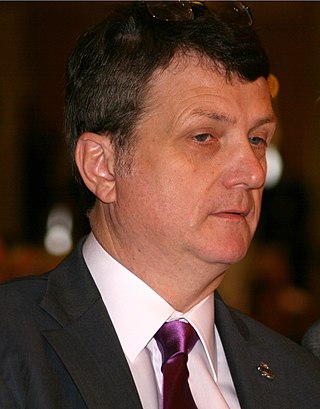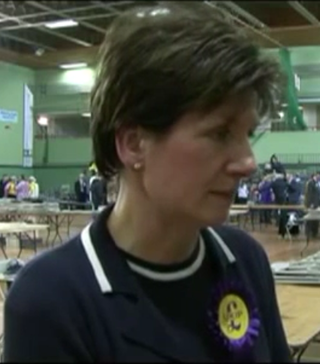
The UK Independence Party is a Eurosceptic, right-wing populist political party in the United Kingdom. The party reached its greatest level of success in the mid-2010s, when it gained two members of parliament and was the largest party representing the UK in the European Parliament. The party is currently led by Nick Tenconi.

Jeffrey William Titford was a British politician who served as leader of the UK Independence Party (UKIP) from 2000 until 2002. He served again as interim leader in September to November 2010, following the resignation of Lord Pearson of Rannoch. He was also a Member of the European Parliament (MEP) for the East of England from 1999 to 2009. Before entering politics he was a businessman and president of the National Association of Funeral Directors.

Nigel Paul Farage is a British politician and broadcaster who has been Member of Parliament (MP) for Clacton and Leader of Reform UK since 2024, having previously been its leader from 2019 to 2021. He was the leader of the UK Independence Party (UKIP) from 2006 to 2009 and 2010 to 2016. Farage served as a member of the European Parliament (MEP) for South East England from 1999 until the UK's withdrawal from the European Union (EU) in 2020.

Gerard Joseph Batten is a British politician who served as the Leader of the UK Independence Party (UKIP) from 2018 to 2019. He was a founding member of the party in 1993, and served as a Member of the European Parliament (MEP) for London from 2004 to 2019.

David Campbell Bannerman is a British politician who served as Member of the European Parliament (MEP) for the East of England from 2009 to 2019. He is currently Chairman of the Conservative Democratic Organisation and The Freedom Association. A member of the Conservative Party, he previously served as Deputy Leader of UK Independence Party (UKIP) from 2006 until 2010, when he was replaced by Paul Nuttall.

Nicole Sinclaire is a British former politician who was leader of the We Demand a Referendum Party, and served as a Member of the European Parliament for the West Midlands from 2009 to 2014.
The UK Independence Party (UKIP) held a leadership election in September 2006.

The UK Independence Party (UKIP) held a leadership election in 2009, with ballots closing on 26 November. The election was won by Malcolm Pearson.

The 2014 European Parliament election was the United Kingdom's component of the 2014 European Parliament election, held on Thursday 22 May 2014, coinciding with the 2014 local elections in England and Northern Ireland. In total, 73 Members of the European Parliament were elected from the United Kingdom using proportional representation. England, Scotland and Wales use a closed-list party list system of PR, while Northern Ireland used the single transferable vote (STV).
Margaret Lucille Jeanne Parker is a British former politician who served as a Member of the European Parliament (MEP) for the East Midlands region between 2014 and 2019.

Diane Martine James is a British politician who was a Member of the European Parliament (MEP) for South East England from 2014 to 2019. She was briefly leader-elect of the UK Independence Party (UKIP) from September 2016 to October 2016, but resigned before formalising her leadership. At the time of her election to the European Parliament, James was one of three UKIP MEPs for South East England, before joining the Brexit Party in 2019.

Steven Marcus Woolfe is a British barrister, writer, commentator and former politician. He is currently the Director of the Centre for Migration & Economic Prosperity a research think tank studying population and immigration into the UK, Europe and US. He was a Member of the European Parliament (MEP) for North West England from 2014 until 2019. From 2014 he was a UKIP MEP but resigned to become an Independent MEP in October 2016 following his opposition to the party's overly negative policy on immigration. He remained independent until July 2019.

David Adam Coburn is a Scottish politician and businessman who served as a Member of the European Parliament (MEP) for Scotland from 2014 to 2019. A former member of the UK Independence Party (UKIP), Coburn was the leader of UKIP Scotland from July 2014 until December 2018.

Nigel Farage is a British MP for Clacton and former MEP for South East England who has stood as a candidate representing eurosceptic parties UK Independence Party (UKIP) and Reform UK since 1994. He was a Member of the European Parliament representing South East England from the 1999 election until the British withdrawal from the European Union in 2020, winning re-election four times. Farage has stood for election to the House of Commons eight times, in six general elections and two by-elections, losing in every attempt until 2024 in Clacton. He was also a proponent of the UK leaving the European Union in the 2016 referendum, in which the electorate voted to do so by 52% to 48%.

The September 2016 UK Independence Party leadership election was triggered after Nigel Farage, the leader of the UK Independence Party, announced on 4 July 2016, following the Leave result in the UK referendum on EU membership, that he would step down when a new leader had been elected.
The November 2016 UK Independence Party leadership election took place following the announcement on 4 October 2016 by Diane James, the leader-elect of the UK Independence Party, that she would not accept the leadership of the party, despite winning the leadership election 18 days earlier. Nigel Farage, whom James was to succeed after the previous leadership election following his resignation, was selected the next day to serve as interim leader.
The 2017 UK Independence Party leadership election was called following the resignation of Paul Nuttall as leader of the UK Independence Party on 9 June 2017, following the poor performance of the party in the 2017 general election. Former party chairman Steve Crowther was chosen three days later to serve as interim leader.
The 2018 UK Independence Party leadership election was triggered after members voted to remove Henry Bolton as leader of the UK Independence Party at an extraordinary general meeting held in Birmingham on 17 February 2018. It was the fourth UKIP leadership election in eighteen months. Interim leader Gerard Batten was ultimately elected unopposed as the party's new leader.

Reform UK, colloquially known as Reform, is a right-wing populist political party in the United Kingdom. Nigel Farage has served as the party's leader since June 2024 and Richard Tice has served as the party's deputy leader since July 2024. The party currently has five members of Parliament (MPs) in the House of Commons and one member of the London Assembly. The party also holds representation at the local government level, with most of its local councillors having defected from the Conservative Party to Reform UK. Following Farage's resumption of the leadership during the 2024 general election, there was a sharp increase in support for the party. In the election it was the third largest party by popular vote, with 14.3 per cent of the vote.
The 2019 UK Independence Party leadership election took place following the departure on 2 June of Gerard Batten from the leadership of the UK Independence Party. The result was announced on 10 August 2019, with Richard Braine being elected to lead the party. This was the party's fifth leadership election in three years. Braine resigned just two months later, triggering a sixth leadership election.


















